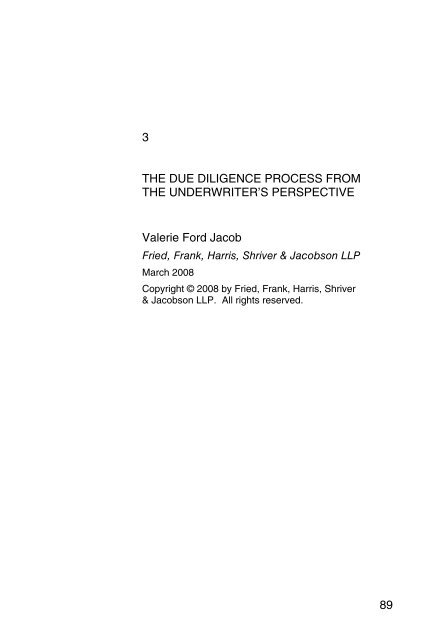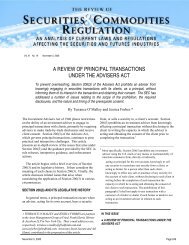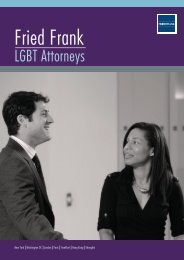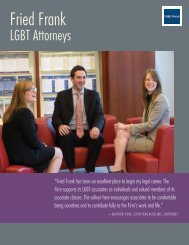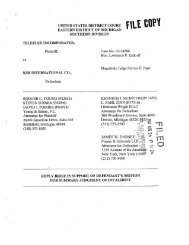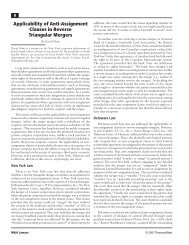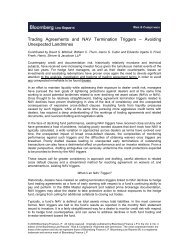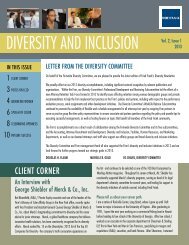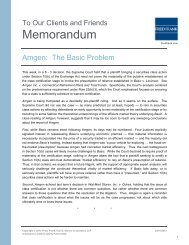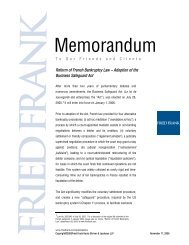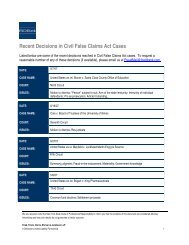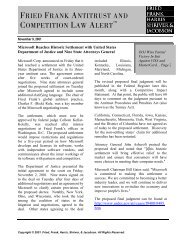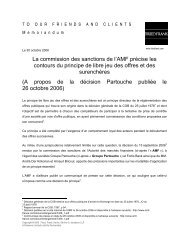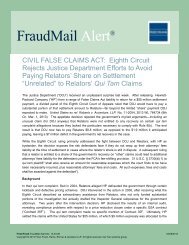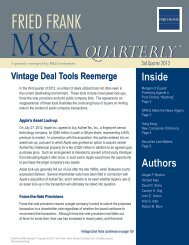The due diligence process from the underwriter's - Fried Frank
The due diligence process from the underwriter's - Fried Frank
The due diligence process from the underwriter's - Fried Frank
Create successful ePaper yourself
Turn your PDF publications into a flip-book with our unique Google optimized e-Paper software.
3<br />
THE DUE DILIGENCE PROCESS FROM<br />
THE UNDERWRITER’S PERSPECTIVE<br />
Valerie Ford Jacob<br />
<strong>Fried</strong>, <strong>Frank</strong>, Harris, Shriver & Jacobson LLP<br />
March 2008<br />
Copyright © 2008 by <strong>Fried</strong>, <strong>Frank</strong>, Harris, Shriver<br />
& Jacobson LLP. All rights reserved.<br />
89
Table of Contents<br />
1. WHY DO UNDERWRITERS CONDUCT DUE DILIGENCE ...................... 5<br />
2. THE DUE DILIGENCE DEFENESE UNDER U.S. LAW ............................. 5<br />
3. WHEN IS THE DUE DILIGENCE PERFORMED ...................................... 8<br />
4. WHAT ARE THE COMPONENTS OF THE DUE DILIGENCE<br />
PROCESS ................................................................................................. 9<br />
a. Background Due Diligence ........................................................ 10<br />
b. Business Due Diligence ............................................................. 10<br />
c. Financial Due Diligence ............................................................. 11<br />
d. MD&A Due Diligence ................................................................. 13<br />
e. Legal Due Diligence .................................................................. 14<br />
f. Accounting Due Diligence ......................................................... 15<br />
g. Backup ....................................................................................... 17<br />
h. Backup vs. Verification .............................................................. 17<br />
i. Corporate Governance/Sarbanes-Oxley Due Diligence ........... 18<br />
j. Audit Committee Due Diligence ................................................ 19<br />
5. SPECIAL CONSIDERATIONS FOR EUROPEAN DUE<br />
DILIGENCE ...............................................................................................20<br />
6. SEVERAL DUE DILIGENCE CONSIDERATIONS SPECIFICALLY<br />
FOR DEBT OFFERINGS ..........................................................................20<br />
7. WHY DO BANK-DEBT ARRANGERS CONDUCT DUE<br />
DILIGENCE .............................................................................................20<br />
a. Bank Debt Due Diligence Standards Differ From Underwriter<br />
Standards .................................................................................. 21<br />
8. WORLDCOM LITIGATION: CASE STUDY ON UNDERWRITER DUE<br />
DILIGENCE ...............................................................................................22<br />
9. CONCLUSION ...........................................................................................25<br />
3<br />
91
1. WHY DO UNDERWRITERS CONDUCT DUE DILIGENCE<br />
• <strong>The</strong>re are six principal reasons why underwriters perform <strong>due</strong><br />
<strong>diligence</strong>:<br />
• Due <strong>diligence</strong> will assist in understanding <strong>the</strong> company and<br />
<strong>the</strong>reby help in drafting a more accurate prospectus or<br />
offering document.<br />
• During <strong>the</strong> <strong>due</strong> <strong>diligence</strong> <strong>process</strong> you may uncover negative<br />
information about <strong>the</strong> company which may cause <strong>the</strong> deal to<br />
be restructured, delayed or even, on occasion, pulled.<br />
• <strong>The</strong> <strong>due</strong> <strong>diligence</strong> <strong>process</strong> may indicate that third party<br />
consents or approvals are necessary in order to consummate<br />
<strong>the</strong> transaction.<br />
• Investors expect <strong>the</strong> underwriters or initial purchasers to have<br />
conducted full <strong>due</strong> <strong>diligence</strong> and protection of <strong>the</strong> investment<br />
bank’s institutional reputation requires that bankers do<br />
thorough <strong>due</strong> <strong>diligence</strong>. Negative surprises after an offering is<br />
completed reflect badly on <strong>the</strong> investment bank which<br />
underwrote <strong>the</strong> deal.<br />
• Liability in connection with <strong>the</strong> public offering of securities<br />
can be imposed upon those accepting responsibility for <strong>the</strong><br />
prospectus. <strong>The</strong> prospectus is required by law to include and<br />
truthfully represent all material information about <strong>the</strong><br />
company. In U.S. litigation involving allegations of<br />
inaccurate disclosure in <strong>the</strong> U.S. prospectus, <strong>the</strong> underwriters<br />
can assert <strong>due</strong> <strong>diligence</strong> as a defense to liability.<br />
• Markets outside <strong>the</strong> United States may require analogous<br />
procedures. For example, it is <strong>the</strong> U.K. practice to “verify”<br />
each statement in <strong>the</strong> prospectus in part to protect against this<br />
type of liability.<br />
2. THE DUE DILIGENCE DEFENSE UNDER U.S. LAW<br />
• Section 11 of <strong>the</strong> Securities Act of 1933 provides that any person<br />
acquiring a security in an offering can sue specified defendants if<br />
<strong>the</strong> disclosure in <strong>the</strong> prospectus is not accurate in a material respect.<br />
• <strong>The</strong> statute provides that <strong>the</strong> defendants in any such suit may<br />
include <strong>the</strong> underwriters, <strong>the</strong> directors of <strong>the</strong> company, <strong>the</strong><br />
5<br />
93
company’s principal executive officer, principal financial<br />
officer and principal accounting officer, and <strong>the</strong> company’s<br />
auditors and o<strong>the</strong>r experts named in <strong>the</strong> prospectus.<br />
• However, <strong>the</strong> statute also provides underwriters with a <strong>due</strong><br />
<strong>diligence</strong> defense. <strong>The</strong> applicable standard depends on<br />
whe<strong>the</strong>r <strong>the</strong> misstatement is made in reliance on an expert’s<br />
opinion.<br />
• <strong>The</strong> statute specifically provides a complete defense with<br />
respect to any part of <strong>the</strong> registration statement that does not<br />
rely on <strong>the</strong> authority of an expert if <strong>the</strong> underwriter “had,<br />
after reasonable investigation, reasonable ground to believe<br />
and did believe, . . . that <strong>the</strong> statements [in <strong>the</strong> registration<br />
statement] were true and that <strong>the</strong>re was no omission to state a<br />
material fact required to be stated <strong>the</strong>rein or necessary to<br />
make <strong>the</strong> statements <strong>the</strong>rein not misleading.”<br />
• Where entitled to rely upon <strong>the</strong> opinion of an expert, <strong>the</strong>re<br />
will be no liability if <strong>the</strong> underwriter “had no reasonable<br />
ground to believe, and did not believe, . . . that <strong>the</strong> statements<br />
[in <strong>the</strong> registration statement] were untrue or that <strong>the</strong>re was an<br />
omission to state a material fact required to be stated <strong>the</strong>rein<br />
or necessary to make <strong>the</strong> statements <strong>the</strong>rein not misleading.”<br />
• Section 12(a)(2) provides that any purchaser of a security can sue<br />
any person who offered or sold <strong>the</strong> security, by means of a<br />
prospectus or oral communications which contains a material<br />
misstatement or omission, unless <strong>the</strong> defendant “did not know, and<br />
in <strong>the</strong> exercise of reasonable care could not have known” of <strong>the</strong><br />
misstatement or omission. Section 12(a)(2) does not make any<br />
distinction based upon “expertised” statements.<br />
• <strong>The</strong> SEC has stated that <strong>the</strong> standard of care under<br />
Section 12(a)(2) is less demanding than that prescribed by<br />
Section 11 (i.e., Section 11 requires a more diligent investigation<br />
than Section 12(a)(2)). <strong>The</strong> SEC also has stated that any<br />
practices or factors that would be considered favorably under<br />
Section 11 also would be considered favorably under <strong>the</strong> reasonable<br />
care standard of Section 12(a)(2).<br />
• In December 2005, <strong>the</strong> SEC adopted a number of reforms to <strong>the</strong><br />
securities offering <strong>process</strong>. In particular, SEC Rule 159 provides<br />
that, for purposes of determining whe<strong>the</strong>r a preliminary prospectus<br />
6<br />
94
or o<strong>the</strong>r written or oral statement gives rise to prospectus-level<br />
Section 12(a)(2) liability for <strong>the</strong> user because it includes a<br />
materially false or misleading statement at <strong>the</strong> time of sale (i.e.,<br />
pricing), only information conveyed to investors at or prior to <strong>the</strong><br />
time of sale may be considered. Accordingly, information conveyed<br />
after pricing (e.g., by a final prospectus) will not be taken into<br />
account in determining whe<strong>the</strong>r all material information was<br />
delivered to investors. This new rule has put additional pressure on<br />
<strong>the</strong> offering <strong>process</strong> through more emphasis on completing<br />
<strong>diligence</strong> earlier in <strong>the</strong> <strong>process</strong> and <strong>the</strong> preparation of updates prior<br />
to pricing.<br />
• An SEC rule identifies <strong>the</strong> following factors as important in<br />
determining how much <strong>due</strong> <strong>diligence</strong> is necessary for underwriters<br />
to meet <strong>the</strong> statutory standard:<br />
• <strong>the</strong> type of issuer,<br />
• <strong>the</strong> type of security,<br />
• reasonable reliance on officers, employees and o<strong>the</strong>rs whose<br />
duties should have given <strong>the</strong>m knowledge of <strong>the</strong> particular<br />
facts,<br />
• <strong>the</strong> type of underwriting arrangement, <strong>the</strong> role of <strong>the</strong><br />
particular person as an underwriter and <strong>the</strong> availability of<br />
information with respect to <strong>the</strong> registration, and<br />
• whe<strong>the</strong>r, with respect to a fact or document incorporated by<br />
reference, <strong>the</strong> particular person had any responsibility for <strong>the</strong><br />
fact or document at <strong>the</strong> time of <strong>the</strong> filing <strong>from</strong> which it was<br />
incorporated.<br />
• U.S. courts may consider <strong>the</strong>se factors in <strong>the</strong> context of 144A<br />
offerings as well.<br />
• Although <strong>the</strong> underwriting agreement contains an indemnity by <strong>the</strong><br />
company to <strong>the</strong> underwriter for any losses sustained by <strong>the</strong><br />
underwriter, <strong>the</strong> indemnity should not be deemed a substitute for<br />
effective <strong>due</strong> <strong>diligence</strong>, for <strong>the</strong> following reasons:<br />
• <strong>the</strong> indemnity may not be enforceable,<br />
• <strong>the</strong> underwriter may be required to litigate aspects of <strong>the</strong><br />
indemnity,<br />
7<br />
95
• <strong>the</strong> company may not have enough money to back up <strong>the</strong><br />
indemnity,<br />
• for foreign issuers, <strong>the</strong> company’s assets may be located<br />
outside <strong>the</strong> United States, making <strong>the</strong>m much harder to<br />
access, and<br />
• even if <strong>the</strong> indemnity is enforceable and <strong>the</strong> underwriter can<br />
recoup its monetary losses, <strong>the</strong> harm to <strong>the</strong> underwriter’s<br />
reputation <strong>from</strong> bad publicity, and <strong>the</strong> time and resources<br />
necessary to defend against securities litigation, can be<br />
significant.<br />
3. WHEN IS THE DUE DILIGENCE PERFORMED<br />
• Due <strong>diligence</strong> is an ongoing <strong>process</strong> which should be continuously<br />
done <strong>from</strong> <strong>the</strong> date of receipt of <strong>the</strong> initial mandate through <strong>the</strong><br />
closing date.<br />
• In a typical U.S. registered underwritten offering, most of <strong>the</strong> <strong>due</strong><br />
<strong>diligence</strong> is done before <strong>the</strong> first filing of <strong>the</strong> registration statement<br />
with <strong>the</strong> SEC. This includes most of <strong>the</strong> legal <strong>due</strong> <strong>diligence</strong>, <strong>the</strong><br />
management interviews and <strong>the</strong> accounting <strong>due</strong> <strong>diligence</strong>. (This is<br />
completed before <strong>the</strong> distribution of <strong>the</strong> “red herring” or<br />
preliminary offering memorandum in a Rule 144A/Regulation S<br />
offering, as <strong>the</strong> SEC does not review and comment on such<br />
offerings.)<br />
• Sometimes site tours are done after <strong>the</strong> first filing. In a<br />
Rule 144A offering, this is typically done before printing of<br />
<strong>the</strong> preliminary offering memorandum.<br />
• Although it is a better practice to finalize customer and<br />
supplier interviews before <strong>the</strong> first filing, sometimes customer<br />
and supplier interviews are done after <strong>the</strong> first filing because<br />
companies are concerned about prematurely disclosing <strong>the</strong>ir<br />
transaction.<br />
• Frequently, <strong>the</strong> drafting sessions can be extremely useful as <strong>due</strong><br />
<strong>diligence</strong> sessions. Sometimes more <strong>due</strong> <strong>diligence</strong> can be accomplished<br />
with management at a drafting session than at <strong>the</strong> management<br />
interviews <strong>the</strong>mselves.<br />
• <strong>The</strong> underwriters should have a separate <strong>due</strong> <strong>diligence</strong> discussion<br />
with <strong>the</strong> company with respect to new quarterly or year-end<br />
8<br />
96
numbers which become available for inclusion in <strong>the</strong> offering<br />
document.<br />
• In particular, it is important to update <strong>the</strong> <strong>due</strong> <strong>diligence</strong> between <strong>the</strong><br />
time of filing <strong>the</strong> initial registration statement and <strong>the</strong> time of<br />
printing red herrings, and between <strong>the</strong> time of printing red herrings<br />
and <strong>the</strong> pricing date.<br />
• When markets are uncertain and offerings are delayed for<br />
long periods of time, it is particularly important to update <strong>the</strong><br />
<strong>due</strong> <strong>diligence</strong> when printing red herrings or pricing <strong>the</strong> deal<br />
because changes in <strong>the</strong> business may be more numerous over<br />
<strong>the</strong> longer time period.<br />
• Results for <strong>the</strong> business since <strong>the</strong> end of <strong>the</strong> most recent<br />
publicly reported quarter need to be carefully scrutinized<br />
because <strong>the</strong>y are typically not disclosed in <strong>the</strong> offering<br />
memorandum or prospectus.<br />
• Underwriters should conduct “pre-pricing” and “pre-closing” <strong>due</strong><br />
<strong>diligence</strong> bring-down telephone calls with <strong>the</strong> company.<br />
4. WHAT ARE THE COMPONENTS OF THE DUE DILIGENCE<br />
PROCESS<br />
• <strong>The</strong> amount of <strong>due</strong> <strong>diligence</strong> performed will of necessity vary <strong>from</strong><br />
deal to deal. It is <strong>the</strong>refore difficult to establish a uniform set of<br />
procedures for all deals.<br />
• In an offering of debt securities, <strong>the</strong> company’s existing and future<br />
liquidity and cash flows may be more significant than in an equity<br />
deal. In equity deals, <strong>the</strong> growth prospects of <strong>the</strong> company may be<br />
more important than <strong>the</strong> company’s short term cash flows. This will<br />
impact <strong>the</strong> type of <strong>due</strong> <strong>diligence</strong> performed.<br />
• <strong>The</strong> various components of <strong>the</strong> <strong>due</strong> <strong>diligence</strong> <strong>process</strong> include:<br />
• background <strong>due</strong> <strong>diligence</strong>,<br />
• business <strong>due</strong> <strong>diligence</strong>,<br />
• financial <strong>due</strong> <strong>diligence</strong>,<br />
• MD&A <strong>due</strong> <strong>diligence</strong>,<br />
• legal <strong>due</strong> <strong>diligence</strong>,<br />
9<br />
97
• accounting <strong>due</strong> <strong>diligence</strong>,<br />
• backup review,<br />
• corporate governance/Sarbanes-Oxley <strong>due</strong> <strong>diligence</strong>, if<br />
appropriate, and<br />
• audit committee <strong>due</strong> <strong>diligence</strong>, if appropriate or deemed<br />
necessary.<br />
a. Background Due Diligence<br />
• Underwriters can review public sources of information<br />
about a company and its industry:<br />
• Lexis/Nexis searches of newspaper and magazine articles<br />
about <strong>the</strong> company, its directors and officers and its industry,<br />
as well as Google searches (should be done as early as<br />
possible in <strong>the</strong> deal)<br />
• Analyst or rating agency reports on <strong>the</strong> company or industry<br />
sector<br />
• Industry-specific magazines (such as Automotive Rental<br />
News or Chemical Report)<br />
• <strong>The</strong> company’s web site (which may include archived press<br />
releases and investor presentations)<br />
• <strong>The</strong> company’s SEC, statutory or stock exchange filings<br />
• Prospectuses or SEC filings of companies in <strong>the</strong> same<br />
industry<br />
• Press releases or articles regarding <strong>the</strong> company or <strong>the</strong><br />
industry<br />
• Third party chat rooms devoted to <strong>the</strong> company<br />
• Public information about <strong>the</strong> country in which <strong>the</strong> company<br />
conducts most of its business<br />
b. Business Due Diligence<br />
• <strong>The</strong> underwriters will also engage in a formal business <strong>due</strong><br />
<strong>diligence</strong> procedure which may include some or all of <strong>the</strong><br />
following elements:<br />
10<br />
98
• interviews with senior management (CEO, CFO, SVPs) of<br />
<strong>the</strong> company<br />
• It is often a good idea to ask <strong>the</strong> same question to<br />
different people at different levels of management in a<br />
company. Sometimes you will get conflicting answers.<br />
• background check of management<br />
• interviews with <strong>the</strong> company’s middle management, such as<br />
<strong>the</strong> officers in charge of marketing, sales, human resources,<br />
production, manufacturing or o<strong>the</strong>r core areas<br />
• site tours of <strong>the</strong> company’s principal facilities or retail<br />
locations<br />
• interviews with <strong>the</strong> company’s principal customers, suppliers<br />
or o<strong>the</strong>r business partners<br />
• <strong>The</strong>se interviews should be conducted without <strong>the</strong><br />
company’s presence.<br />
• In some transactions <strong>the</strong> underwriters may retain specialized consultants.<br />
For example, <strong>the</strong> underwriters may retain retail consultants<br />
to tour and evaluate a new distribution center or information<br />
systems consultants to evaluate <strong>the</strong> company’s systems.<br />
• <strong>The</strong> underwriters should follow up with <strong>the</strong> company or o<strong>the</strong>r<br />
appropriate persons on issues raised by <strong>the</strong> consultants.<br />
• In general, <strong>the</strong> underwriters and underwriters’ counsel should<br />
regularly communicate with each o<strong>the</strong>r about issues <strong>the</strong>y each<br />
uncover during <strong>the</strong> <strong>due</strong> <strong>diligence</strong> <strong>process</strong>.<br />
c. Financial Due Diligence<br />
• Bankers review in detail <strong>the</strong> company’s projections and business<br />
model with <strong>the</strong> company’s CFO and financial management.<br />
Underwriters’ counsel should be involved in <strong>the</strong> <strong>process</strong>.<br />
• Bankers should analyze <strong>the</strong> reasonableness of <strong>the</strong> assumptions<br />
underlying <strong>the</strong> projections. Bankers should evaluate<br />
whe<strong>the</strong>r <strong>the</strong> business model is realistic.<br />
• Bankers may review a base case model, a best case model<br />
and a worst case model.<br />
11<br />
99
• Bankers should perform a sensitivity analysis to determine<br />
<strong>the</strong> key drivers and risk factors for <strong>the</strong> business.<br />
• Bankers should review <strong>the</strong> company’s capital expenditure<br />
plans (for maintenance and for growth) and need to consider<br />
when large cash outlays by <strong>the</strong> company are required.<br />
• Bankers should compare <strong>the</strong> company’s key financial<br />
statistics with <strong>the</strong> statistics of competitors.<br />
• Review of projections will frequently result in modifications or<br />
enhancements to <strong>the</strong> description of <strong>the</strong> company’s business<br />
strategy and MD&A in <strong>the</strong> prospectus.<br />
• Bankers and lawyers should verify whe<strong>the</strong>r <strong>the</strong> company’s credit<br />
facilities need to be amended in order to allow <strong>the</strong> company to<br />
achieve its business plan. For example, <strong>the</strong> capital expenditures<br />
covenant may limit <strong>the</strong> company’s expansion plans.<br />
• Bankers can calculate whe<strong>the</strong>r <strong>the</strong> debt or equity offering will<br />
cause <strong>the</strong> company to violate financial covenants in <strong>the</strong><br />
company’s financing documents.<br />
• Bankers should focus on off-balance sheet or under-recorded<br />
liabilities and contingencies, including in particular potential<br />
employee benefit plan liabilities (unfunded pension plans) and<br />
worker’s compensation liabilities.<br />
• Review of financial statement footnotes will describe<br />
potential contingencies.<br />
• Bankers should also focus on large items on <strong>the</strong> income statement<br />
which affect <strong>the</strong> quality of <strong>the</strong> company’s earnings, such as<br />
• unusual or nonrecurring items,<br />
• related party transactions,<br />
• acquisitions and divestitures,<br />
• potential compensation charges as a result of cheap stock<br />
issues and<br />
• reversal of accrued liabilities.<br />
• When dealing with non-U.S. issuers, bankers should also focus<br />
on differences between U.S. and non-U.S. GAAP. Significant<br />
differences may involve:<br />
12<br />
100
• revenue recognition<br />
• goodwill<br />
• pension accounting<br />
• accounting for stock options<br />
d. MD&A Due Diligence<br />
• MD&A is an increasingly important focus of company<br />
disclosure. SEC rules require disclosures about off-balance sheet<br />
liabilities and contractual obligations in <strong>the</strong> MD&A, and o<strong>the</strong>r<br />
SEC guidance calls for disclosure in MD&A of liquidity and<br />
capital resources and related party transactions.<br />
• Segment, divisional, operating unit and product line data should<br />
be carefully reviewed to determine trends that may not be<br />
disclosed in <strong>the</strong> draft MD&A.<br />
• Underwriters should <strong>due</strong> <strong>diligence</strong> <strong>the</strong> company’s financial<br />
performance since <strong>the</strong> most recent period included in <strong>the</strong> MD&A.<br />
Underwriters should obtain as much information in as much<br />
detail as possible for <strong>the</strong> most recent period. Companies are often<br />
reluctant to do more than say that <strong>the</strong>ir numbers seem generally<br />
on target.<br />
• Even though <strong>the</strong> latest month or interim period would not be<br />
described in <strong>the</strong> MD&A, any trend which appears in <strong>the</strong><br />
financial performance for this most recent period should be<br />
described in <strong>the</strong> overview section of <strong>the</strong> MD&A if material.<br />
<strong>The</strong> new period may show that an uncertain blip in <strong>the</strong> most<br />
recent quarter is actually becoming a trend.<br />
• It is important to review cost items as a percentage of sales ra<strong>the</strong>r<br />
than on a total basis in order to determine <strong>the</strong> trends in costs.<br />
• Discussions should be held with <strong>the</strong> appropriate personnel<br />
regarding future, anticipated or possible cost increases, such<br />
as labor costs <strong>due</strong> to a tight labor market or supply costs <strong>due</strong><br />
to a new supply contract.<br />
• Underwriters should focus on changes in margins.<br />
• For example, comparing profit margins (operating income<br />
divided by net sales) of <strong>the</strong> company over <strong>the</strong> years can show<br />
<strong>the</strong> company’s growth in profitability or decline. It is also<br />
13<br />
101
useful to compare <strong>the</strong> company’s profit margins with those of<br />
<strong>the</strong> o<strong>the</strong>r companies in <strong>the</strong> industry.<br />
• Increases in profits and sales can mask margin difficulties.<br />
Acquisitions may also mask margin difficulties. Sometimes<br />
margin issues can be detected by focusing on product mix.<br />
• Year to year comparisons are of less value in acquisitive companies<br />
or companies in <strong>the</strong> <strong>process</strong> of increasing <strong>the</strong>ir number of<br />
stores or outlets. Underwriters need to review <strong>the</strong> base business<br />
or same store sales to determine what is really happening.<br />
• Additionally, underwriters should <strong>diligence</strong> <strong>the</strong> definition of<br />
same store sales or base business sales to make sure <strong>the</strong><br />
periods are comparable. For example, some companies may<br />
include a renovated store as a same store which could skew<br />
results or include a new plant in <strong>the</strong> base business which<br />
could skew <strong>the</strong> results.<br />
e. Legal Due Diligence<br />
• Attorneys submit a <strong>due</strong> <strong>diligence</strong> request list and review some or<br />
all of <strong>the</strong> following:<br />
• board of director minutes of <strong>the</strong> company and principal<br />
subsidiaries<br />
• board of director packages<br />
• lawyer letters to accountants<br />
• reports to management <strong>from</strong> accountants<br />
• charters and bylaws<br />
• stockholders agreements, registration rights agreements,<br />
warrants, preferred stock and o<strong>the</strong>r documents relating to <strong>the</strong><br />
company’s outstanding securities<br />
• indentures, loan agreements and credit facilities<br />
• o<strong>the</strong>r material business contracts<br />
• employment agreements, stock option plans and stock<br />
purchase plans<br />
• D&O questionnaires<br />
14<br />
102
• Correspondence with <strong>the</strong> SEC or o<strong>the</strong>r regulators (including<br />
comment letters and responses)<br />
• Attorneys typically review <strong>the</strong> company’s outstanding litigation<br />
and, where necessary, interview outside counsel handling<br />
principal litigation.<br />
• O<strong>the</strong>r areas where attorneys may provide particular expertise in<br />
<strong>due</strong> <strong>diligence</strong> includes:<br />
• tax <strong>diligence</strong>, particularly involving IRS investigations,<br />
• intellectual property and a review of <strong>the</strong> company’s licensing<br />
agreements,<br />
• employee benefit plans and stock option plans,<br />
• special regulatory issues, involving telecommunications or<br />
o<strong>the</strong>r areas, and<br />
• government, antitrust, SEC or o<strong>the</strong>r investigations of <strong>the</strong><br />
company’s business.<br />
• <strong>The</strong> underwriters’ counsel typically provides a 10b-5 opinion to<br />
<strong>the</strong> underwriter which states that <strong>the</strong> underwriters’ counsel is not<br />
aware of any material misstatement or material omission in <strong>the</strong><br />
time of sale information package (i.e., <strong>the</strong> preliminary prospectus<br />
toge<strong>the</strong>r with a final term sheet or oral conveyance of final terms)<br />
as well as <strong>the</strong> final prospectus. <strong>The</strong> underwriters will receive a<br />
similar opinion <strong>from</strong> <strong>the</strong> issuer’s counsel. Courts have cited<br />
receipt of this opinion as a factor in evaluating <strong>the</strong> underwriters’<br />
<strong>diligence</strong>.<br />
• Sometimes negotiation of <strong>the</strong> representations and warranties in<br />
<strong>the</strong> underwriting agreement can raise <strong>due</strong> <strong>diligence</strong> issues if <strong>the</strong><br />
company is unable to make standard representations.<br />
• Company counsel may prepare a formal legal <strong>due</strong> <strong>diligence</strong><br />
report in a European context.<br />
f. Accounting Due Diligence<br />
• <strong>The</strong> bankers and lawyers should interview <strong>the</strong> company’s principal<br />
accountants and, where material, accountants of acquired entities.<br />
Principal topics of discussion may include:<br />
• <strong>the</strong> company’s accounting policies generally,<br />
15<br />
103
• <strong>the</strong> company’s revenue recognition and capital expenditures<br />
policies,<br />
• potential disagreements with <strong>the</strong> company,<br />
• consistency of <strong>the</strong> company’s accounting policies with<br />
industry norms,<br />
• issues discussed or raised in <strong>the</strong> accountants’ “management<br />
letters,”<br />
• off-balance sheet liabilities, if any,<br />
• <strong>the</strong> company’s liquidity position,<br />
• significant write-offs, if any, and<br />
• proposed changes in <strong>the</strong> accounting rules or accounting<br />
literature which could impact <strong>the</strong> company’s financial<br />
statements.<br />
• <strong>The</strong> company’s accountants should verify whe<strong>the</strong>r <strong>the</strong> company’s<br />
financials will be impacted by cheap stock, beneficial conversion<br />
feature or share based payment issues.<br />
• <strong>The</strong> company’s accountants should attend drafting sessions or<br />
participate in drafting conference calls. <strong>The</strong> accountants often<br />
know <strong>the</strong> company extremely well and can be very helpful in<br />
crafting accurate disclosure.<br />
• Accountants will also provide a comfort letter to <strong>the</strong> underwriters.<br />
Courts have cited receipt of a comfort letter as a significant<br />
part of <strong>the</strong> underwriter’s <strong>due</strong> <strong>diligence</strong> defense.<br />
• One significant of <strong>the</strong> comfort letter is <strong>the</strong> bringdown of <strong>the</strong><br />
company’s income statement and balance sheet since <strong>the</strong><br />
most recent balance sheet date included in <strong>the</strong> registration<br />
statement. This can be an important mechanism for verifying<br />
how <strong>the</strong> company is doing in <strong>the</strong> most recent months. Alternative<br />
<strong>due</strong> <strong>diligence</strong> procedures (certificates, discussions with<br />
management) can also be used in lieu of or in addition to <strong>the</strong><br />
comfort letter bringdown.<br />
• It is important for <strong>the</strong> bankers and <strong>the</strong> underwriters’ counsel<br />
to consult prior to <strong>the</strong> pricing on any negative information<br />
which emerges in <strong>the</strong> accountants’ bringdown of <strong>the</strong> financial<br />
statements in <strong>the</strong> comfort letter.<br />
16<br />
104
• In U.K. public equity offerings a long form accountants report is<br />
part of <strong>the</strong> <strong>due</strong> <strong>diligence</strong> <strong>process</strong>. It will include a statement of<br />
working capital and historical information regarding <strong>the</strong> issuer.<br />
g. Backup<br />
• Ano<strong>the</strong>r important part of <strong>the</strong> <strong>due</strong> <strong>diligence</strong> <strong>process</strong> is making<br />
sure that <strong>the</strong> underwriters and underwriters’ counsel have<br />
received adequate backup for industry statistics, market share and<br />
similar data included in <strong>the</strong> prospectus.<br />
• Frequently <strong>the</strong> sources of major statements, such as <strong>the</strong><br />
company’s market share or leading position, will be discussed or,<br />
in some cases, distributed, during initial drafting sessions.<br />
• <strong>The</strong> underwriters’ counsel should distribute a “backup request” to<br />
<strong>the</strong> issuer and issuer’s counsel asking for backup for particular<br />
numbers and qualitative phrases.<br />
• In addition to achieving more accurate disclosure, ano<strong>the</strong>r benefit<br />
of obtaining all of <strong>the</strong> necessary backup before <strong>the</strong> first SEC<br />
filing is that in <strong>the</strong> first round of SEC comments on <strong>the</strong><br />
prospectus <strong>the</strong> SEC frequently asks for backup support for<br />
statements in <strong>the</strong> prospectus. It will be easier to respond to <strong>the</strong><br />
SEC if <strong>the</strong> company has already ga<strong>the</strong>red all of <strong>the</strong> backup.<br />
h. Backup vs. Verification<br />
• <strong>The</strong> U.S. style of <strong>due</strong> <strong>diligence</strong> reports is less formal than <strong>the</strong><br />
U.K. style. Whereas in <strong>the</strong> U.S. <strong>the</strong> underwriters’ counsel will<br />
record <strong>the</strong> documents reviewed and <strong>the</strong> persons with whom<br />
counsel discussed various issues, U.K. solicitors often produce<br />
verification notes.<br />
• Verification notes comprise a number of questions based on<br />
every sentence in <strong>the</strong> prospectus to which answers must be<br />
provided by <strong>the</strong> responsible parties. Each answer must contain an<br />
appropriate reference to <strong>the</strong> evidence for, and <strong>the</strong> source of, <strong>the</strong><br />
information underlying <strong>the</strong> particular answer. Eventually <strong>the</strong><br />
solicitor produces <strong>the</strong> final version of <strong>the</strong> verification notes with<br />
all supporting documentation for <strong>the</strong> board of director’s review<br />
and approval.<br />
• It is becoming more common on dual listed offerings to use a<br />
more “U.S.” style of <strong>due</strong> <strong>diligence</strong> procedure with more limited<br />
17<br />
105
verification notes. <strong>The</strong> proper balance should be discussed early<br />
in a transaction and will depend on <strong>the</strong> circumstances.<br />
i. Corporate Governance/Sarbanes-Oxley Due Diligence<br />
• In light of <strong>the</strong> passage of <strong>the</strong> Sarbanes-Oxley Act and <strong>the</strong> SEC<br />
rules promulgated <strong>the</strong>reunder, underwriters may also consider<br />
engaging in a <strong>due</strong> <strong>diligence</strong> review of <strong>the</strong> corporate governance<br />
policies of <strong>the</strong> company.<br />
• Underwriters could focus on, among o<strong>the</strong>r things, <strong>the</strong> following<br />
topics in discussions with <strong>the</strong> company:<br />
• filing of CEO/CFO certifications under Section 302 and<br />
Section 906 of <strong>the</strong> Sarbanes-Oxley Act,<br />
• <strong>the</strong> company’s disclosure controls and procedures and<br />
internal controls,<br />
• <strong>the</strong> company’s code of ethics and any exemptions to <strong>the</strong><br />
code,<br />
• <strong>the</strong> company’s whistleblowing procedures,<br />
• any loans <strong>from</strong> <strong>the</strong> company to management,<br />
• <strong>the</strong> composition of <strong>the</strong> audit committee and whe<strong>the</strong>r <strong>the</strong>re is a<br />
“financial expert” on <strong>the</strong> audit committee,<br />
• <strong>the</strong> composition of a nominating committee, if applicable,<br />
• <strong>the</strong> company’s internal audit function,<br />
• <strong>the</strong> company’s document retention policy,<br />
• any non-audit services provided by <strong>the</strong> company’s<br />
independent auditors,<br />
• any restatements of <strong>the</strong> company’s financial statements,<br />
• any unresolved comments <strong>from</strong> <strong>the</strong> SEC in connection with<br />
any filing,<br />
• any off-balance sheet transactions, and<br />
• any non-GAAP financial information in its 1934 Act reports<br />
or press releases.<br />
18<br />
106
j. Audit Committee Due Diligence<br />
• Underwriters may also consider having a discussion with <strong>the</strong><br />
chairman or a member of <strong>the</strong> audit committee. This is not<br />
currently a standard practice in <strong>the</strong> <strong>due</strong> <strong>diligence</strong> <strong>process</strong>, but on<br />
occasion could be helpful as part of an overall <strong>diligence</strong> review.<br />
Any such discussion could include <strong>the</strong> following topics:<br />
• <strong>the</strong> structure of <strong>the</strong> audit committee,<br />
• <strong>the</strong> audit committee’s meeting <strong>process</strong>, review of financial<br />
data and line of communication with <strong>the</strong> company,<br />
• any significant issues encountered by <strong>the</strong> audit committee,<br />
• <strong>the</strong> audit committee’s review <strong>process</strong> for periodic reports and<br />
monthly statements,<br />
• <strong>the</strong> audit committee’s review of internal controls,<br />
• <strong>the</strong> audit committee’s review of any off-balance sheet<br />
liabilities and contingencies,<br />
• <strong>the</strong> mechanism used by <strong>the</strong> audit committee to select <strong>the</strong><br />
auditors,<br />
• any <strong>process</strong> for meeting with auditors without management,<br />
• <strong>the</strong> company’s critical accounting policies;<br />
• any related party transactions,<br />
• <strong>the</strong> impact of any new accounting or SEC pronouncements<br />
on <strong>the</strong> company’s financials,<br />
• any goodwill amortization,<br />
• <strong>the</strong> level of communication between management and <strong>the</strong><br />
audit team,<br />
• any significant accounting issues that have arisen in<br />
connection with <strong>the</strong> most recent periodic reports,<br />
• any material issues discussed at <strong>the</strong> most recent meetings,<br />
• <strong>the</strong> audit committee’s review of taxes and tax reserves and<br />
• any significant disagreements between <strong>the</strong> audit committee<br />
and <strong>the</strong> auditors or between <strong>the</strong> audit committee and management.<br />
19<br />
107
5. SPECIAL CONSIDERATIONS FOR EUROPEAN DUE<br />
DILIGENCE<br />
• <strong>The</strong> legal structures which govern <strong>the</strong> sale of securities differ in<br />
European countries compared to <strong>the</strong> U.S. and also differ across<br />
European countries.<br />
• Underwriting liability standards vary by jurisdiction and range <strong>from</strong><br />
absolute liability to limited liability for managers and underwriters.<br />
Due <strong>diligence</strong> defenses may or may not be available. <strong>The</strong> law is<br />
also not very well developed in this area.<br />
• Issuers in Europe are often less accustomed to U.S. style <strong>due</strong><br />
<strong>diligence</strong> procedures and tend to be more resistant to procedures<br />
considered standard in <strong>the</strong> U.S.<br />
6. SEVERAL DUE DILIGENCE CONSIDERATIONS SPECIFICALLY<br />
FOR DEBT OFFERINGS<br />
• In debt offerings it is important to focus during <strong>the</strong> <strong>due</strong> <strong>diligence</strong><br />
<strong>process</strong> on <strong>the</strong> following items:<br />
• <strong>the</strong> effects of transactions on <strong>the</strong> company’s debt rating,<br />
• <strong>the</strong> effects of transactions on <strong>the</strong> company’s cash flow,<br />
• <strong>the</strong> company’s debt repayment schedule,<br />
• <strong>the</strong> company’s worst case/downside scenario,<br />
• <strong>the</strong> use of <strong>the</strong> proceeds of <strong>the</strong> debt offering, and<br />
• <strong>the</strong> necessity of raising additional cash in order to allow <strong>the</strong><br />
company to complete its business plan.<br />
7. WHY DO BANK-DEBT ARRANGERS CONDUCT DUE<br />
DILIGENCE<br />
• <strong>The</strong>re are six principal reasons why bank debt arrangers perform<br />
<strong>due</strong> <strong>diligence</strong>. With one exception, <strong>the</strong>se are similar to <strong>the</strong> reasons<br />
underwriters perform <strong>due</strong> <strong>diligence</strong>.<br />
• Diligence helps <strong>the</strong> lender assess <strong>the</strong> borrower’s credit risk.<br />
• Due <strong>diligence</strong> will assist in understanding <strong>the</strong> company and<br />
<strong>the</strong>reby helping in drafting a more accurate bank book.<br />
20<br />
108
• During <strong>the</strong> <strong>due</strong> <strong>diligence</strong> <strong>process</strong> you may uncover negative<br />
information about <strong>the</strong> company which may cause <strong>the</strong> deal to<br />
be restructured, delayed or even, on occasion, pulled.<br />
• <strong>The</strong> <strong>due</strong> <strong>diligence</strong> <strong>process</strong> may indicate that third party<br />
consents or approvals are necessary in order to consummate<br />
<strong>the</strong> transaction.<br />
• Syndicate members expect <strong>the</strong> arranger to have conducted full<br />
<strong>due</strong> <strong>diligence</strong> and <strong>the</strong> arranger’s institutional reputation<br />
requires that bankers do thorough <strong>due</strong> <strong>diligence</strong>.<br />
• Although no law specifies <strong>the</strong> content of a bank information<br />
memorandum, in litigation, <strong>due</strong> <strong>diligence</strong> may establish<br />
necessary defenses to liability on <strong>the</strong> part of <strong>the</strong> arranger.<br />
a. Bank Debt Due Diligence Standards Differ From<br />
Underwriter Standards<br />
• Reduced arranger liability concerns for disclosure errors or<br />
omissions result in greater flexibility in terms of what to include<br />
in <strong>the</strong> information memorandum and how it is included.<br />
• Less labored disclosure is required.<br />
• Projections (<strong>the</strong> business model) are normally central to <strong>the</strong><br />
information memorandum.<br />
• Although <strong>the</strong> <strong>diligence</strong> topics covered and matters reviewed are<br />
similar, <strong>the</strong> <strong>diligence</strong> focuses on identifying potential credit<br />
“black holes,” confirming matters stated in <strong>the</strong> information<br />
memorandum and confirming that known liabilities (actual or<br />
contingent) are appropriately reflected in <strong>the</strong> business model.<br />
• <strong>The</strong>re can be greater flexibility in formulating an appropriate <strong>due</strong><br />
<strong>diligence</strong> review. For example, in an acquisition financing, <strong>the</strong><br />
arranger may choose to rely on appropriate <strong>diligence</strong> reports<br />
addressed to it <strong>from</strong> legal advisors to <strong>the</strong> borrower since (1) <strong>the</strong><br />
legal documentation and issues that normally would be reviewed<br />
by <strong>the</strong> arranger’s own counsel would be <strong>the</strong> same, and (2) <strong>the</strong><br />
borrower and lenders’ interests in a “good” acquisition are<br />
aligned.<br />
21<br />
109
8. WORLDCOM LITIGATION: CASE STUDY ON UNDERWRITER<br />
DUE DILIGENCE<br />
• In December 2004 an important decision issued in <strong>the</strong> Sou<strong>the</strong>rn<br />
District of New York evaluated an underwriter’s <strong>due</strong> <strong>diligence</strong> in<br />
<strong>the</strong> context of two bond offerings by WorldCom.<br />
• <strong>The</strong> case arose in connection with Worldcom’s bankruptcy<br />
and related restatement of its 2000 and 2001 financial<br />
statements, which included approximately $76 billion of<br />
adjustments and reduced Worldcom’s net equity <strong>from</strong><br />
$50 million to negative $20 billion.<br />
• Bondholders brought class action suits which alleged material<br />
misstatements and omissions in <strong>the</strong> registration statements for<br />
two Worldcom bond offerings in May 2000 and May 2001.<br />
<strong>The</strong> cases were brought under Sections 11 and 12(a)(2) of <strong>the</strong><br />
Securities Act of 1933. Defendants included Worldcom, its<br />
directors and senior officers, Arthur Anderson (its primary<br />
auditor) and <strong>the</strong> lead underwriters for <strong>the</strong> offerings.<br />
• <strong>The</strong> defendant underwriters sought judicial declarations of<br />
summary judgment, stating that <strong>the</strong>y had satisfied <strong>the</strong>ir <strong>due</strong><br />
<strong>diligence</strong> defense under both Sections 11 and 12(a)(2). <strong>The</strong><br />
underwriters said that all of <strong>the</strong> alleged misstatements were<br />
issues of accounting, based primarily on errors in <strong>the</strong> financial<br />
statements, and thus <strong>the</strong> underwriters were entitled to rely on<br />
<strong>the</strong> audits and comfort letters <strong>the</strong>y had received.<br />
• <strong>The</strong> written record of <strong>due</strong> <strong>diligence</strong> for <strong>the</strong> May 2000 offering was<br />
a memorandum prepared by underwriters’ counsel. <strong>The</strong> memo described<br />
a May 17, 2000 conversation in which WorldCom’s CFO<br />
was asked questions about a pending merger with Sprint, whe<strong>the</strong>r<br />
WorldCom had experienced problems integrating prior acquisitions,<br />
and whe<strong>the</strong>r <strong>the</strong>re were any o<strong>the</strong>r material issues. <strong>The</strong><br />
memorandum also outlined WorldCom’s board minutes, listed its<br />
public filings, referred to its press releases, and discussed Sprint<br />
documents. <strong>The</strong> underwriters also received a comfort letter. <strong>The</strong><br />
<strong>due</strong> <strong>diligence</strong> for <strong>the</strong> 2001 offering was similar.<br />
• With respect to alleged misstatements in <strong>the</strong> audited financial<br />
statements, <strong>the</strong> court refused to grant summary judgment in favor<br />
of <strong>the</strong> underwriters, who argued that <strong>the</strong>y were entitled to rely on<br />
<strong>the</strong> clean audit opinions included in <strong>the</strong> registration statement.<br />
22<br />
110
• Even though <strong>the</strong> financial statements were audited, <strong>the</strong><br />
plaintiffs claimed that <strong>the</strong> underwriters had a reasonable<br />
ground to question <strong>the</strong> reliability of <strong>the</strong> data. Plaintiffs<br />
showed that WorldCom’s critical ratio of line costs to revenue<br />
was 43%, significantly lower than <strong>the</strong> equivalent ratio of its<br />
two closest competitors, Sprint (53.2%) and AT&T (46.8%).<br />
<strong>The</strong> plaintiffs claimed that this discrepancy triggered a duty to<br />
investigate such a crucial measurement of <strong>the</strong> company’s<br />
health. Ultimately a significant reason for WorldCom’s<br />
financial statement restatement was <strong>due</strong> to significant<br />
understatement of line costs.<br />
• <strong>The</strong> underwriters argued that an audited figure can never<br />
constitute a red flag and impose a duty of investigation,<br />
because <strong>the</strong>y are “expertised” by <strong>the</strong> accountants. However,<br />
<strong>the</strong> court said that “<strong>the</strong> existence of red flags can create a duty<br />
to investigate even audited financial statements.” In this case,<br />
<strong>the</strong> court concluded, a reasonable person would have inquired<br />
fur<strong>the</strong>r about <strong>the</strong> discrepancy between <strong>the</strong> audited figures and<br />
<strong>the</strong> comparable information <strong>from</strong> competitors.<br />
• Similarly, plaintiffs said that <strong>the</strong> underwriters should have<br />
questioned <strong>the</strong> accuracy of WorldCom’s reported assets, given <strong>the</strong><br />
public knowledge of <strong>the</strong> deterioration in MCI’s long-distance<br />
telephone business. Since $29 billion of WorldCom’s $47 billion<br />
purchase price for MCI was attributed to goodwill, an intangible<br />
asset, <strong>the</strong> underwriters should have known that an asset impairment<br />
charge was necessary. <strong>The</strong> court concluded that “<strong>the</strong>re are issues of<br />
fact regarding WorldCom’s statement of its assets that a jury may<br />
find raised a red flag and imposed upon <strong>the</strong> Underwriter<br />
Defendants <strong>the</strong> obligation to inquire.”<br />
• With respect to alleged misstatements in unaudited financial<br />
statements, <strong>the</strong> court also refused to grant summary judgment in<br />
favor of <strong>the</strong> underwriters, who argued that <strong>the</strong>y were entitled to rely<br />
on <strong>the</strong> accountant’s comfort letter and <strong>the</strong> absence of any<br />
knowledge of accounting red flags on <strong>the</strong>ir part.<br />
• <strong>The</strong> court found that, with respect to unaudited financial<br />
statements, in order to succeed with a <strong>due</strong> <strong>diligence</strong> defense,<br />
<strong>the</strong> underwriters must show that <strong>the</strong>y conducted a reasonable<br />
investigation of <strong>the</strong> non-expertised portions of <strong>the</strong> registration<br />
statement and had reasonable ground to believe that <strong>the</strong><br />
23<br />
111
interim financial statements were true. Receipt of a comfort<br />
letter is important evidence but by itself is insufficient to<br />
establish a <strong>due</strong> <strong>diligence</strong> defense.<br />
• <strong>The</strong> underwriters argued that no amount of <strong>diligence</strong> could<br />
have uncovered WorldCom’s massive accounting fraud, since<br />
even <strong>the</strong> auditors had not detected it. However, <strong>the</strong> court<br />
found that even if it appears that an investigation would have<br />
proven futile in uncovering a fraud, <strong>the</strong> underwriter must still<br />
conduct a reasonable investigation in order to prevail on <strong>the</strong><br />
<strong>due</strong> <strong>diligence</strong> defense.<br />
• <strong>The</strong> underwriters argued that if <strong>the</strong>y could not rely on a comfort<br />
letter for <strong>the</strong>ir <strong>due</strong> <strong>diligence</strong> of <strong>the</strong> unaudited financial statements,<br />
underwriters will always have to hire <strong>the</strong>ir own accounting firms in<br />
order to check <strong>the</strong> work done by <strong>the</strong> company’s auditors. However,<br />
<strong>the</strong> court responded that it was not imposing any obligation on<br />
underwriters to hire auditors in every offering.<br />
• “<strong>The</strong> term ‘reasonable investigation’ encompasses many<br />
modes of inquiry between obtaining comfort letters <strong>from</strong> an<br />
auditor and doing little more, on one hand, and having to reaudit<br />
a company’s books on <strong>the</strong> o<strong>the</strong>r. None<strong>the</strong>less, if aggressive<br />
or unusual accounting strategies regarding significant issues<br />
come to light in <strong>the</strong> course of a reasonable investigation,<br />
a prudent underwriter may choose to consult with accounting<br />
experts to confirm that <strong>the</strong> accounting treatment is appropriate<br />
and that additional disclosure is unnecessary.”<br />
• <strong>The</strong> court questioned whe<strong>the</strong>r <strong>the</strong> underwriter’s <strong>due</strong> <strong>diligence</strong> effort<br />
was satisfactory.<br />
• “<strong>The</strong> Lead Plaintiff has shown that <strong>the</strong>re are questions of fact,<br />
however, as to whe<strong>the</strong>r <strong>the</strong> Underwriter Defendants conducted<br />
a reasonable investigation in ei<strong>the</strong>r 2000 or 2001. It points to<br />
what it contends is evidence of <strong>the</strong> limited number of<br />
conversations with <strong>the</strong> issuer or its auditor, <strong>the</strong> cursory nature<br />
of <strong>the</strong> inquiries, <strong>the</strong> failure to go behind any of <strong>the</strong> almost<br />
formulaic answers given to questions, and <strong>the</strong> failure to<br />
inquire into issues of particular prominence in <strong>the</strong> Underwriter<br />
Defendants’ own internal evaluations of <strong>the</strong> financial<br />
condition of <strong>the</strong> issuer or in <strong>the</strong> financial press.”<br />
24<br />
112
• “It argues in particular with respect to 2001, that having<br />
internally downgraded WorldCom’s credit rating and having<br />
taken steps to limit <strong>the</strong>ir exposure as WorldCom creditors, <strong>the</strong><br />
Underwriter Defendants were well aware that WorldCom was<br />
in a deteriorating financial position in a troubled industry, and<br />
that a reasonable investigation would have entailed a more<br />
searching inquiry than that undertaken by <strong>the</strong> Underwriter<br />
Defendants. Given <strong>the</strong> enormity of <strong>the</strong>se two bond offerings,<br />
and <strong>the</strong> general deterioration in WorldCom’s financial<br />
situation, at least as of <strong>the</strong> time of <strong>the</strong> 2001 Offering, <strong>the</strong>y<br />
argue that a particularly probing inquiry by a prudent<br />
underwriter was warranted. <strong>The</strong>se issues of fact require a jury<br />
trial.”<br />
• <strong>The</strong> underwriters ending up settling <strong>the</strong> case for $6.0 billion. <strong>The</strong><br />
underwriting fees earned on <strong>the</strong> offerings totaled only $84.0 million.<br />
9. CONCLUSION<br />
• Underwriters should participate in <strong>the</strong> offering <strong>process</strong> with a<br />
healthy amount of “skepticism” about <strong>the</strong> claims of management.<br />
• People do not always tell <strong>the</strong> truth, sometimes unintentionally, and<br />
people may neglect to tell you important facts.<br />
• In evaluating underwriter <strong>due</strong> <strong>diligence</strong>, courts look favorably on<br />
underwriters that follow up on red flags when <strong>the</strong>y are detected.<br />
• Courts also advise underwriters not to simply rely on <strong>the</strong> statements<br />
of management but to verify management’s statements.<br />
• <strong>The</strong> underwriters should explain to <strong>the</strong> company in advance of <strong>the</strong><br />
offering that <strong>the</strong> <strong>due</strong> <strong>diligence</strong> effort is aimed at creating a more accurate<br />
disclosure document (which benefits <strong>the</strong> company) and also<br />
helps <strong>the</strong> underwriters satisfy <strong>the</strong>ir own regulatory requirements.<br />
25<br />
113
114<br />
NOTES


